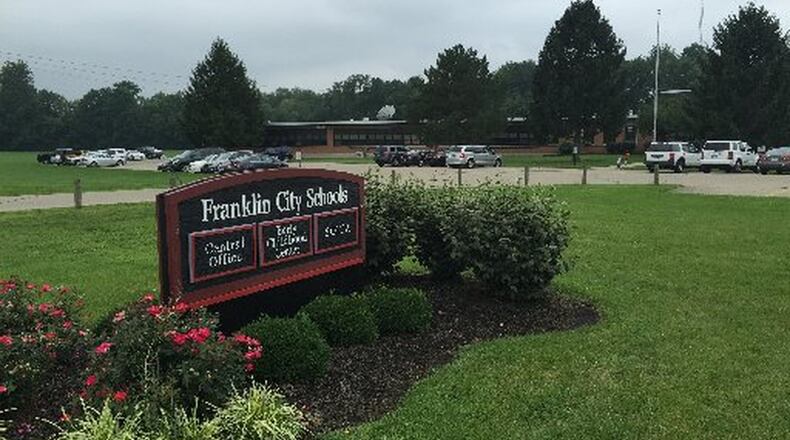Substitute levies do not raise tax rates on existing taxpayers, but allow the district to see revenue growth in future years, as the levy’s tax rates are applied to any new construction in the years to come, according to district officials.
If voters approve the May 2 substitute levy, the five-year, 13.92-mill substitute levy will generate $7.75 million a year and will continue to cost a property owner $488 per $100,000 of property valuation, according to the Warren County Auditor’s Office.
If the renewal levy is not approved by voters in 2023, Treasurer Kevin Hawley said the district would project a negative fund balance by the end of fiscal year 2025, and could lose nearly 21% of its revenues by the end of fiscal year 2027.
Franklin City Schools’ current operating budget for 2022-23 is $38.1 million, down from $38.6 million the year before. The district has been in deficit spending the past three years, according to its five-year forecast, and projects that to continue. At the end of last school year, Franklin had about 16% of a year’s spending in the bank, roughly half of the average local school district.
When asked to describe in one word how another levy defeat would impact the district, Superintendent Michael Sander said “devastating.”
“It’s vital,” Sander said. “We understand money is tight and we appreciate what the community does for its schools. But it’s important to continue to invest in our schools if we want to keep up the momentum. Our children deserve a quality education.”
Longtime Franklin Twp. resident Joy Broedling voiced another side of the argument, complaining about the district’s management of funds, raising concerns about the number of administrators, and citing state test scores to say the quality of education has not improved.
“It’s irresponsible spending especially during times like these as property owners foot the bill,” she said.
On the state report card, Franklin ranked at the exact midpoint of 607 Ohio school districts last year in performance index on state tests. But the district got 4 out of 5 stars for students’ year-over-year progress, ranking in the top 15% in “growth index.” Franklin spent more per student than the average Ohio school district, also ranking in the top 20% in that category as well, according to the Ohio Department of Education.
The last time Franklin residents approved a school levy for new day-to-day operating funds was 2013, which is right at the average among the Dayton area’s 20 largest school districts.
Sander said Franklin has already made about $1 million in cuts, including purchasing fewer Chromebooks and not adopting the math, science and English/language arts curriculum series.
Sander said the district is planning $1.1 million in cuts for 2023-2024 regardless of the outcome of the May levy. Those cuts include about 13 staff, including seven certified teaching positions.
Should the levy fail on May 2, Sander said another $1.9 million will be cut, including 10 additional certified teaching positions; reduction of busing to state minimum (elimination of high school busing, and only busing those more than two miles away in elementary and junior high); increasing pay-to-participate fees to $300 per high school sport and $200 per junior high sport and eliminating the family cap; plus several other steps.
“I’m cautiously optimistic that voters will approve the levy,” Sander said. “I’m hearing more positive talk in the community. I feel the community is better educated because the community is realizing what the kids will lose.”
A community forum is scheduled for 7 p.m. Thursday at the Franklin High School cafeteria to answer questions about the levy. The session will be live-streamed online.
Sander also emphasized that the substitute levy is totally separate from the bond issue funds being used to construct the new high school and renovate the current high school to become a middle school. Bond issue funds cannot be used for daily operating expenses.
He said construction will continue regardless of the outcome of the substitute levy vote and/or budget cuts. It will not affect students moving into the new facilities next year.
About the Author

